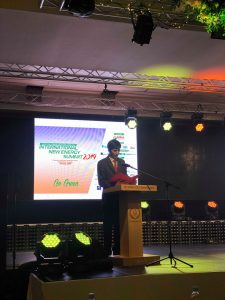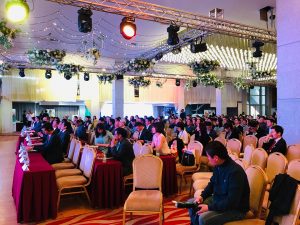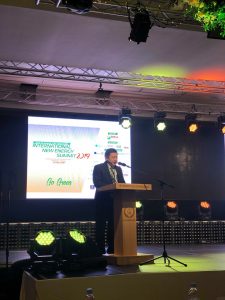 On May 23, the International New Energy Summit took place in Ulaanbaatar, under the auspices of the Prime Minister of Mongolia. The event was an initiative by the Mongolian Renewables Industries Association (MRIA) and was supported by the Ministry of Environment and Tourism (MoET), Energy Regulatory Commission of Mongolia (ERC), the Environmental Organization of Ulaanbaatar City, Erdenes Mongol LLC (State-owned), Global Wind Energy Council (GWEC), Institute for Global Environmental Strategies (IGES), and Global Green Growth Institute (GGGI).
On May 23, the International New Energy Summit took place in Ulaanbaatar, under the auspices of the Prime Minister of Mongolia. The event was an initiative by the Mongolian Renewables Industries Association (MRIA) and was supported by the Ministry of Environment and Tourism (MoET), Energy Regulatory Commission of Mongolia (ERC), the Environmental Organization of Ulaanbaatar City, Erdenes Mongol LLC (State-owned), Global Wind Energy Council (GWEC), Institute for Global Environmental Strategies (IGES), and Global Green Growth Institute (GGGI).
The main objective of the Green Summit is to introduce the experiences, practices, and advanced technologies used to reduce the environmental impact of energy and make a contribution to the realization of Mongolia’s Intended Contribution to the Paris Agreement on Climate Change. The summit is a main platform for mainstreaming further business opportunities for the advanced-technology based energy sector and helps to strengthen international cooperation.
Mr. Enkhbayar.D, an advisor to the Prime Minister, and Mr. Tsenge. Ts, State Secretary for the Ministry of Environment and Tourism, made the opening speeches for the Green Summit. “I hope this event will accelerate the collaboration and mutual understanding of stakeholders in development of renewable energy sector in the country” said Mr.Tsengel in his opening speech.
By organizing this event, participants had the opportunity to learn from international experiences of developing renewable energy, the introduction of advanced technologies in the wind and solar sectors, and discussions of harnessing the development of renewable energy in Mongolia.
Key issues addressed during the Summit include the following:
• Global energy trends and opportunities in Mongolia;
• Policy framework to develop renewable energy;
• Paris agreement process and implementation;
• Technology cost in renewable energy;
• Low carbon energy solution;
• Asian Super Grid;
• Rural area electrification;
• Renewable energy application on heating;
• Green city;
• Renewable energy application on mining;
• Grid-connected storage system;
• Waste to Energy;
• Smart energy solution;
• Renewable energy investment in Mongolia;
 GGGI has been one of the sponsors of this Energy Forum since 2016. It is the biggest event for renewable energy development of Mongolia and more than 500 experts from the government, non-government organizations, the private sector, and research institutions participated in the event. The forum sessions are moderated by highly experienced professionals. Romain Brillie, Mongolia Country Representative, was a panelist in the first session under the theme of “Green Policy”.
GGGI has been one of the sponsors of this Energy Forum since 2016. It is the biggest event for renewable energy development of Mongolia and more than 500 experts from the government, non-government organizations, the private sector, and research institutions participated in the event. The forum sessions are moderated by highly experienced professionals. Romain Brillie, Mongolia Country Representative, was a panelist in the first session under the theme of “Green Policy”.
Background
Due to rapid global industrial development, the world climate temperature has increased by 0.75 Celsius over last the hundred years, and if this continues, the average temperature is expected to reach up to 4 Celsius by 2030. Scientific research study shows that the Northern iceberg would be consequently melted, around 760 million people would be evacuated, and a new type of ailment would likely emerge.
In 2015, the United Nations Conference of Parties-21 was held in Paris, involving 50 thousand delegates from 195 countries, and the participants unanimously agreed to promote renewable energy against climate change. Therefore, 173 countries had renewable energy targets in place and 146 countries had support policies. Cities, communities, and companies are leading the rapidly expanding “100% renewable” movement, playing a vital role in advancing the global energy transition. Production of renewable energy accounted for 26.5% of total energy production by 2018 and YOY growth has increased by 7.2%.
Mongolia has tremendous source in terms of the renewable energy, and the potential production capacity from solar and wind energy is about 2000 times larger than Mongolia’s annual energy consumption, 2.4 times greater than Chinese annual energy consumption. This indicates that Mongolia has a huge capacity for renewable energy development. In recent years, in align with the global renewable energy development trend, 20 percent of total installed capacity should have been from renewable energy in Mongolia. However, the current renewable energy production is at a relatively low level and accounts for nearly 10 percent of total energy production.
Even though the growth of renewables has brought some direct implications, such as an increase in consumer tariffs and large-scale stochastic renewable generation, the social and economic positive impacts override those drawbacks. For example, within last two years, renewable energy was beneficial to Mongolia where a USD 400 million investment was made in renewable energy projects. As a result, 2200 temporary and 200 permanent workplaces were created, and the emission of carbon dioxide reduced by seven hundred thousand tones. It is a vitally important opportunity for Mongolia to promote and adopt renewable energy for every consumer, not only by developing it within an integrated grid system, but also expanding it for off-grid, distribution grid, and micro- grid.
